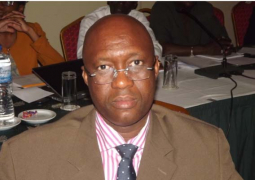
The International Monetary Fund Resident Representative in The Gambia, Gaston K. Mpatswe, has explicitly stated that IMF does not dictate to, or impose on its member country governments what to do as regards managing the affairs of their economies.
All that the IMF does is give professional advice to governments and help with funds or loans to countries, to fund the deficits that usually occur in meeting their balance of payments, Mr Mpatswe told journalists recently at a one-day workshop organised by the local IMF office to train and enlighten media practitioners on IMF operations.
The workshop, which brought together journalists from both the print and electronic media in the country, discussed topics such as IMF’s mandate, operations and relationship with The Gambia, and the key macroeconomic indicators for monitoring performance under the Extended Credit Facility (ECF) arrangement with The Gambia.
Balance of payments (BOP) is simple a measure of the income of a nation, with respect to its transactions, with other nations.
The BOP consists of credits and debits. There are three main credit items such as the income derived from sales as goods and services abroad (exports), investment income earned abroad, and any gifts or transfers made to the nation.
The debits consist of purchases of goods and services from abroad (imports), investment income made at home, but dispatched to foreigners, and transfers abroad (like overseas aid).
The balance between these items represent what is referred to as the ‘balance of payments’ or ‘the current account of the balance of payments’. A surplus on the current account implies income exceeds expenditure (exports exceed imports).
When expenditure exceeds income (that is, imports exceed exports), a deficit occurs, and this is what the IMF comes to fund with loans in support of a country’s payments bill and by extension its economy, explained Mr Mpatswe.
The IMF representative stated further that the Fund’s support and advice is based on the need and support required by member nations, and if that need changes at any point in time, the country could write back to the IMF to see what further steps could be taken to redirect the support.
Mr Mpatswe made it categorically clear that taxation and tax reforms are revenue measures taken and implemented by governments to generate revenue for national use and developments, and such decisions could be supported by the IMF.
Gambia’s current macroeconomic indices
The recent report on the Gambian economy published by the Central Bank of The Gambia on 31 January 2014 stated:
“Provisional data on the execution of the 2013 budget show that total revenue and grants amounted to D5.9 billion (17.5 per cent of GDP), below the target of D7.7 billion (20.0 per cent of GDP). Domestic revenue, comprising both tax and non-tax revenue, increased by 10.6 per cent to D5.2 billion, D4.6 billion of which was on account of international trade taxes. Grants, on the other hand, declined significantly from D1.8 billion in 2012 to D725.1 million in 2013.
“Total expenditure and net lending rose to D8.7 billion (25.5 per cent of GDP), or 11.2 per cent from 2012. Current expenditure increased significantly to D6.3 billion, or 22.4 per cent. Of the main components of current expenditure, wages and salaries increased by 15.1 per cent, other charges (37.8 per cent) and interest payments (7.4 per cent). Capital expenditure, in contrast, declined to D2.32 billion from D2.58 billion in 2012.
“The overall budget deficit (including grants) was D2.7 billion (8.0 per cent of GDP) in 2013, higher than the deficit of D1.3 billion (5.9 per cent of GDP) in 2012. The deficit was financed mainly from domestic sources in the amount of D2.2 billion (6.0 per cent of GDP). External financing amounted to D578.8 million and repayments (D172.7 million).
“The domestic debt, mainly short-term debt, totaled D13.5 billion (39 per cent of GDP), an increase of 25.1 from 2012.”
Read Other Articles In Article (Archive)
GOOD MORNING MR. PRESIDENT: The effects of coronavirus
Mar 30, 2020, 11:00 AM
Workers stand for genuine cause!
May 3, 2013, 10:01 AM


